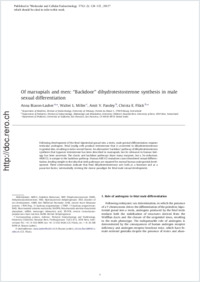Of marsupials and men: “Backdoor” dihydrotestosterone synthesis in male sexual differentiation
- Lauber-Biason, Anna Department of Medicine, Division of Endocrinology, University of Fribourg, Switzerland
- Miller, Walter L. Department of Pediatrics, University of California, San Francisco, United States
- Pandey, Amit V. Department of Pediatrics, Division of Endocrinology, Diabetology and Metabolism, University Children’s Hospital Bern, Switzerland
- Flück, Christa E. Department of Pediatrics, Division of Endocrinology, Diabetology and Metabolism, University Children’s Hospital Bern, Switzerland
-
2013
Published in:
- Molecular and Cellular Endocrinology. - 2013, vol. 371, no. 1-2, p. 124–132
English
Following development of the fetal bipotential gonad into a testis, male genital differentiation requires testicular androgens. Fetal Leydig cells produce testosterone that is converted to dihydrotestosterone in genital skin, resulting in labio-scrotal fusion. An alternative ‘backdoor’ pathway of dihydrotestosterone synthesis that bypasses testosterone has been described in marsupials, but its relevance to human biology has been uncertain. The classic and backdoor pathways share many enzymes, but a 3α-reductase, AKR1C2, is unique to the backdoor pathway. Human AKR1C2 mutations cause disordered sexual differentiation, lending weight to the idea that both pathways are required for normal human male genital development. These observations indicate that fetal dihydrotestosterone acts both as a hormone and as a paracrine factor, substantially revising the classic paradigm for fetal male sexual development.
- Faculty
- Faculté des sciences et de médecine
- Department
- Médecine 3ème année
- Language
-
- English
- Classification
- Biological sciences
- License
-
License undefined
- Identifiers
-
- RERO DOC 31884
- DOI 10.1016/j.mce.2013.01.017
- Persistent URL
- https://folia.unifr.ch/unifr/documents/302910
Statistics
Document views: 114
File downloads:
- pdf: 283
